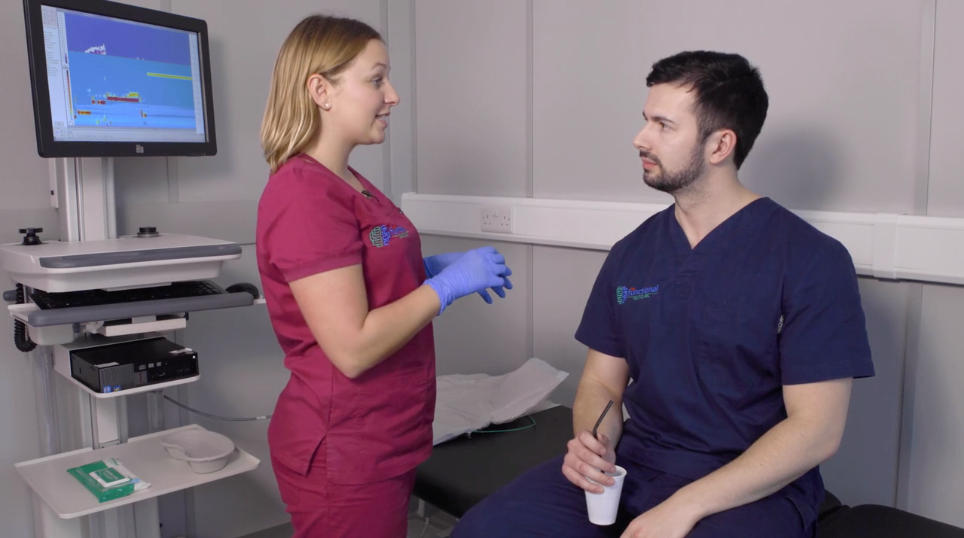By Marianne Otterstad, Trainee GI Physiologist
Inflammatory bowel disease (IBD) is a group of diseases where the gastrointestinal tract is inflamed, and the two most common diseases are Crohn’s disease (CD) and ulcerative colitis (UC)(1).
Following an IBD diagnosis the main priority is to get the acute situation under control.
Inflammatory bowel disease (IBD) is a group of diseases where the gastrointestinal tract is inflamed, and the two most common diseases are Crohn’s disease (CD) and ulcerative colitis (UC) (1). Following an IBD diagnosis the main priority is to get the acute situation under control. However, many patients both in remission and on a stable medical regimen experience irritable bowel syndrome (IBS) symptom such as bloating, abdominal pain and diarrhoea (2). IBS is a diagnosis based on a collection of symptoms, often without a known cause. Three types of IBS exist, the type most commonly seen in IBD being diarrhoea-predominant IBS (IBS-D) (3). Although the exact cause of IBS is unknown, it is associated with a change in the composition of bacteria in the bowel (microbiome), over-sensitivity of the gut and the immune system also plays a role in the disease (4).
It has been established that IBD can alter the microbiome which is one reason why IBS is common in this patient group (5). An over-active immune system and over-sensitive gut also play a part in IBD which further explain the connection between the two diseases(6). IBD and IBS can co-exist, however treatment and prognosis of the two diseases are different so the right diagnosis is crucial(7).
Another cause of IBS-type symptoms in IBD patients in remission is Small Intestinal Bacterial Overgrowth (SIBO) (8). SIBO can be diagnosed using a simple hydrogen and methane breath test which can be used to direct management.
Studies show that treatment with antibiotics can significantly reduce abdominal symptoms in IBD patients in remission (9). IBS-type symptoms in IBD patients may also be managed through diet. Approximately 70% of IBD patients are lactose intolerant(10) which can also be diagnosed by a hydrogen and methane breath test.
References
- Ng SC, Shi HY, Hamidi N, Underwood FE, Tang W, Benchimol EI, et al. Worldwide incidence and prevalence of inflammatory bowel disease in the 21st century: a systematic review of population-based studies. Lancet. 2018;390(10114):2769-78.
- Prevalence of symptoms meeting criteria for irritable bowel syndrome in inflammatory bowel disease: systematic review and meta-analysis. Am J Gastroenterol. 2012; 107: 1474-1482
- Spiller R, Major G. IBS and IBD – separate entities or on a spectrum? Nat Rev Gastroenterol Hepatol. 2016;13(10):613-21.
- Chong PP, Chin VK, Looi CY, Wong WF, Madhavan P, Yong VC. The Microbiome and Irritable Bowel Syndrome – A Review on the Pathophysiology, Current Research and Future Therapy. Front Microbiol. 2019;10:1136.
- Sokol H, Seksik P, Rigottier-Gois L, Lay C, Lepage P, Podglajen I, et al. Specificities of the fecal microbiota in inflammatory bowel disease. Inflamm Bowel Dis. 2006;12(2):106-11.
- Szałwińska P, Włodarczyk J, Spinelli A, Fichna J, Włodarczyk M. IBS-Symptoms in IBD Patients-Manifestation of Concomitant or Different Entities. Journal of clinical medicine. 2020;10(1):31.
- Abdul Rani R, Raja Ali RA, Lee YY. Irritable bowel syndrome and inflammatory bowel disease overlap syndrome: pieces of the puzzle are falling into place. Intest Res. 2016;14(4):297-304.
- Shah A, Morrison M, Burger D, Martin N, Rich J, Jones M, et al. Systematic review with meta-analysis: the prevalence of small intestinal bacterial overgrowth in inflammatory bowel disease. Aliment Pharmacol Ther. 2019;49(6):624-35.
- Cohen-Mekelburg S, Tafesh Z, Coburn E, Weg R, Malik N, Webb C, et al. Testing and Treating Small Intestinal Bacterial Overgrowth Reduces Symptoms in Patients with Inflammatory Bowel Disease. Digestive Diseases and Sciences. 2018;63(9):2439-44.
- Eadala P, Matthews SB, Waud JP, Green JT, Campbell AK. Association of lactose sensitivity with inflammatory bowel disease–demonstrated by analysis of genetic polymorphism, breath gases and symptoms. Aliment Pharmacol Ther. 2011;34(7):735-46.

